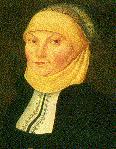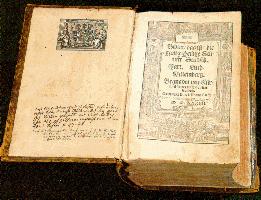Luther's Marriage to Katharina von Bora (1525)

On June 13, 1525 Luther married Katharina von Bora, a nun who had fled from a convent in Nimbsch, near Grimma, and had taken refuge in Wittenberg. Luther's marriage to Katharina (who was 16 years younger than Luther) was oppposed by many of his friends who saw in it the downfall of the Reformation. Philipp Melanchthon spoke of it as an "unlucky deed". He did not know anything about Luther's plan and was not invited to the wedding.
Katharina took over the household, particularly the household expenses; it is said that Dr. Luther did not have a clue how to run a household. She also proved herself to be a good housewife and gardener.
Luther's household included not only his wife and six children, but also one of Katharina's relatives and after 1529 six of Luther's sister's children. Luther also housed students in his home to help the family's financial situation.
Luther's Table Talk (Tischreden) are characteristic of Luther's family life, in which his language and his closeness to the people become very clear.
More information about Katharina von Bora
Wittenberg Town Festival - "Luther's Wedding"
Luther's Influence after 1525
In the following years Luther continued with his reforms of the church and community structure. Among other things, Luther was able to convince the Elector to establish some measures for the security of the Reformation like regulating the salaries of pastors.
In the reform of the worship service, one of the most important changes was allowing the parish to take both the wafer and the wine during Communion.
Luther also took many trips during which he evaluated the work of pastors and the realization of the reforms he had made for the worship service. After one such trip in 1528, the work Instruction of Visitations to Pastors in the Electorate of Saxon by Philipp Melanchthon appeared.
On top of the church reforms Luther wrote many books at this time including the Baptismal Book and Wedding Book and in 1529 the Small and Large Catechism.
In addition Luther who had always been enthusiastic about singing ("The one who sings, prays double") published the Smart Songbook and the choral "A Mighty Fortress is Our God" in 1527.
 In 1534 Luther's complete Bible translation appeared. The translation of the New Testament appeared in 1522 and the work on the Old Testament was finished while he was at the fortress in Coburg in 1530 (further information about the Coburg Fortress - external link!)
In 1534 Luther's complete Bible translation appeared. The translation of the New Testament appeared in 1522 and the work on the Old Testament was finished while he was at the fortress in Coburg in 1530 (further information about the Coburg Fortress - external link!)
The Development of the Reformation within Imperial Politics
The First Imperial Diet of Spires (Speyer; 1526) gave the protestants the first opportunity to legally go ahead with their reforms. It was left up to the local sovereigns as to what extent the reforms were carried through in their territitories.
Although the Imperial Diet of Augsburg in 1530 forbade all reforms, reformers could read the huge success of the reformation in the "Augsburg confession", written by Melanchthon. The reformers explained their beliefs in detail in this book.
Luther was not at the Imperial Diet of Augsburg (He was in Coburg.); however, he was kept abreast of the proceedings by his representatives, especially Melanchthon.
In response to the anti-Reformation statements of the Imperial Diet of Augsburg, protestant estates of the Empire formed the Smalkaldian Alliance in 1530; a defensive alliance founded to protect against catholic attacks.
Luther was in principle against all use of violent action. Luther could not stop the Smalkaldian War (1546-47) even though he had hindered an outbreak of war in 1528 by standing firm against violence. (->The Reformation in Imperial Politics after Luther's Death in 1546).